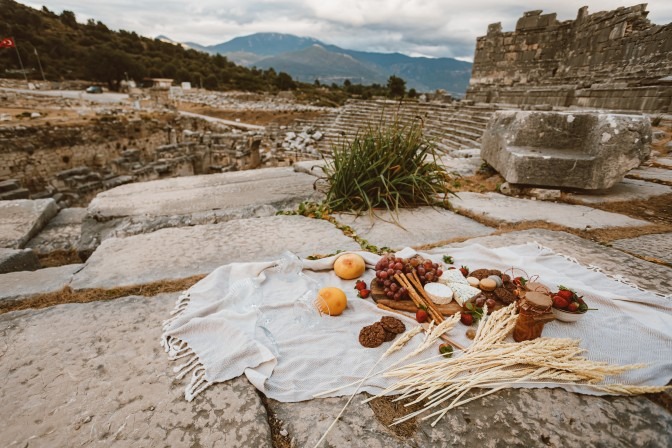
Ancient Greek Cuisine: A Delightful Voyage Through Time
Sept 30, 2023
Are you a food lover? Do you have a keen interest in history? Then, you must have heard about the ancient Greek food. The ancient Greeks were famous for their contributions to literature, philosophy, and politics and had an exceptional culinary tradition that influenced modern-day cooking.
Ancient Greek cuisine is a fascinating reflection of the culture and lifestyle of the ancient Greeks, who thrived between 800 BC and 600 AD. The Mediterranean diet, which included various vegetables, fruits, fish, meat, olive oil, and wine, formed the foundation of their culinary traditions.
The ancient Greeks believed in the philosophy of “moderation in all things”, which was evident in their eating habits. They emphasised consuming a balanced diet that included a diverse range of foods to maintain good health.
As the birthplace of Western civilization, Ancient Greece is renowned for its cuisine. The local ingredients and Mediterranean diet heavily influenced Ancient Greek cuisine. Food played a pivotal role in Ancient Greek culture, not only for sustenance but also for social and cultural significance.
Key Ingredients Used in Ancient Greek Cuisine
Grains and bread were the backbones of Ancient Greek cuisine, with barley being the most commonly used grain. Bread was a staple food, often baked in communal ovens. Olive oil was another crucial ingredient in Ancient Greek cooking, used both for cooking and as a condiment.
Vegetables and fruits were also essential to the Ancient Greek diet. Beans, lentils, figs, and grapes were commonly eaten and often used in stews and salads. Meat and seafood were consumed in moderation, with lamb, beef, fish, and shellfish being the most popular choices.
Wine was a vital part of Ancient Greek culture and cuisine. It was consumed during meals and festivals and often mixed with water to reduce potency. The ancient Greeks believed wine had medicinal properties and could help digestion and overall health.
Popular Dishes in Ancient Greek Cuisine
An iconic meal from Ancient Greek cooking is moussaka, a culinary masterpiece that tantalizes the taste buds with its harmonious blend of flavours. This delectable dish is meticulously crafted, with layers of tender eggplant, succulent beef or lamb, and a velvety béchamel sauce that blankets the entire creation. Each bite is a symphony of textures and tastes, a testament to the culinary prowess of the ancient Greeks.
Another beloved delicacy is dolmades, a culinary treasure wrapped in grape leaves. These parcels are meticulously filled with fragrant rice infused with aromatic herbs, creating flavour with every bite. The marriage of the tender grape leaves and the savoury rice filling is a testament to the ancient Greeks’ ingenuity in creating visually stunning and gastronomically satisfying dishes.
Spanakopita, a savoury pie filled with a luscious combination of feta cheese and vibrant spinach, is a true crowd-pleaser. The flaky pastry crust encases the creamy filling, creating a harmonious blend of textures and flavours. This dish exemplifies the ancient Greeks’ ability to transform simple ingredients into culinary masterpieces that leave a lasting impression.
Souvlaki, a beloved street food, showcases the ancient Greeks’ love for grilled meat. Skewered pieces of succulent meat, whether tender lamb, juicy pork, or flavorful chicken, are expertly grilled to perfection. Souvlaki combines smoky, savoury, and tangy flavours with warm pita bread and a refreshing tzatziki sauce.
Eating Habits and Customs in Ancient Greece
In Ancient Greece, dining was not merely a means of sustenance but a social affair that brought people together. Symposiums, gatherings where men engaged in intellectual discourse, were accompanied by lavish feasts. These symposiums were an opportunity to indulge in delectable dishes and a platform for philosophical and political discussions.
Etiquette played a significant role in ancient Greek dining. It was customary to refrain from using a knife, as it was associated with violence. Instead, the right hand was the preferred utensil for eating. This practice exemplified the ancient Greeks’ emphasis on civility and maintaining a peaceful and harmonious dining experience.
Influences on Ancient Greek Cuisine
Ancient Greek cuisine was a tapestry woven with influences from various cultures. Persian influences are evident in the use of aromatic spices and the preparation of meat-based meals. The ancient Greeks adopted Persian culinary techniques, infusing their dishes with a medley of flavours that elevated their cuisine to new heights.
Roman influences left an indelible mark on ancient Greek cuisine, particularly in the realm of dairy products. Cheese consumption became more prevalent, and the ancient Greeks embraced the art of cheesemaking. Additionally, the Romans introduced the ancient Greeks to the pleasures of wine, which soon became an integral part of their dining culture.
Byzantine cuisine further shaped ancient Greek culinary traditions with its rich and diverse flavours. The Byzantines introduced an array of spices that added depth and complexity to dishes. Nuts and dried fruits also became popular ingredients, adding a delightful crunch and a burst of natural sweetness to various ancient Greek delicacies.
Health Benefits of Ancient Greek Cuisine
Indeed, the health benefits of Ancient Greek cuisine are numerous. The Mediterranean diet, heavily influenced by Ancient Greek cuisine, is known for its heart-healthy benefits. Olive oil, a staple in Greek cooking, is rich in monounsaturated fats and antioxidants that can help lower bad cholesterol levels and reduce the risk of heart disease.
Honey, another common ingredient in Ancient Greek cuisine, is a natural sweetener with antibacterial and anti-inflammatory properties. It can help soothe a sore throat, boost the immune system, and even aid digestion.
Herbs like oregano and thyme, frequently used in Greek cooking, are packed with antioxidants that can help protect the body from harmful free radicals. They also have anti-inflammatory properties and can aid in digestion.
Legacy of Ancient Greek Cuisine
The legacy of Ancient Greek cuisine is evident in many modern dishes. Moussaka, a layered eggplant and meat dish, and tzatziki, a yoghurt-based cucumber and garlic dip, are rooted in Ancient Greek cooking traditions.
Greek cuisine continues to inspire chefs and food enthusiasts around the world. Its emphasis on fresh, local ingredients and simple preparation methods make it a model for healthy, delicious cooking. The Mediterranean diet, focusing on fruits, vegetables, whole grains, and lean proteins, is often recommended by nutritionists for its balance and nutritional value.
Vegetables and Fruits
Vegetables and fruits were an essential part of the ancient Greek diet. They consumed various seasonal produce, including olives, figs, grapes, pomegranates, oranges, apples, pears, cabbage, carrots, leeks, and onions.
Meat and Fish
In the realm of meat and fish, the ancient Greeks demonstrated a culinary finesse that was both simple and sophisticated. Consuming these protein-rich foods was not an everyday affair but a luxury savoured during festive occasions or religious ceremonies. The roast lamb with honey and herbs, for instance, was a dish that showcased the Greeks’ penchant for combining sweet and savoury flavours. The tender and succulent lamb was marinated in honey, rosemary, and thyme, creating a harmonious blend of rich and aromatic flavours.
Beef stew with vegetables was another popular dish, a hearty and comforting meal often served during the colder months. The beef was slow-cooked until it was tender enough to fall apart at the touch of a fork, and the vegetables, which included carrots, onions, and potatoes, added a delightful crunch and freshness to the dish.
Grilled fish with lemon and olive oil was a testament to the Greeks’ love for the sea. Fresh from the Mediterranean, the fish was grilled to perfection and drizzled with a tangy lemon and olive oil dressing. This simple yet delicious dish highlighted the fish’s natural flavours.
The octopus with vinegar and herbs was a delicacy that required skill and patience to prepare. First, it was tenderized, then marinated in a mixture of vinegar, oregano, and thyme, and finally grilled until it was crispy on the outside and tender on the inside.
Grains and Legumes
Grains and legumes were the backbone of the ancient Greek diet, providing the necessary carbohydrates and proteins for their active lifestyle. Barley was a staple grain, often ground into flour and used to make bread or porridge. It was a versatile grain that could be used in various dishes, from savoury stews to sweet desserts.
Wheat was another important grain used primarily for making bread. The Greeks were skilled bakers, and their bread was often flavoured with herbs, honey, or olive oil, adding a unique twist to this everyday staple.
Lentils, chickpeas, and beans were the primary legumes consumed by the Greeks. These were often boiled and served as a side dish or used to make soups and stews. Lentils were particularly popular for their rich, earthy flavour and high protein content.
Cooking Techniques Used in Ancient Greek Food
The ancient Greeks were masters of various cooking techniques, each adding a unique flavour and texture to their dishes. Boiling was a standard method for preparing grains, legumes, and vegetables. It was a simple technique that preserved the natural flavours of the ingredients.
Roasting was another popular technique, often used for cooking meat and fish. This method allowed the Greeks to achieve a crispy exterior and a tender, juicy interior, enhancing the natural flavours of the flesh.
The Greeks perfected grilling, using it to cook everything from fish to vegetables. The high heat of the grill seared the outside of the food, locking in the juices and creating a smoky flavour that was highly prized.
Baking was also a common technique, particularly for making bread and pastries. The Greeks were skilled bakers, and their ovens, made from clay or brick, could reach high temperatures, resulting in perfectly baked goods with a crispy crust and a soft, fluffy interior.
The Greeks also used various types of cookware, including pottery, bronze, and iron. These materials each had their unique properties, and the Greeks understood how to use them to their advantage, creating dishes that were not only delicious but also visually appealing.
Boiling
Boiling, a culinary method that has stood the test of time, was a cornerstone of ancient Greek cuisine. This technique was employed to prepare various ingredients, including vegetables, grains, and legumes. The Greeks understood the art of boiling to perfection, using it to create hearty soups and stews that were a staple in their diet. The process of boiling softened these ingredients and allowed for the melding of flavours, resulting in both nutritious and flavorful dishes. This method was particularly beneficial in preparing legumes, making them easier to digest and unlocking their full nutritional potential.
Roasting and Grilling
Roasting and grilling, techniques that harness the power of fire, were the preferred methods for preparing meat and fish dishes in ancient Greece. The Greeks were masters of these techniques, using an open flame or a charcoal fire to cook their food. This method of cooking imbued the food with a unique, smoky flavour that was highly prized. The heat from the fire caramelized the natural sugars in the meat, creating a delicious crust that sealed in the juices. This resulted in dishes that were tender on the inside and crispy on the outside, a highly sought-after combination.
Baking
Baking was another technique that was widely used in ancient Greek cuisine. The Greeks were skilled bakers, using pottery or metal ovens to create a variety of baked goods. They baked bread, cakes, and pies, showcasing their creativity and expertise. The baking process transformed simple ingredients like flour, water, and yeast into delicious, aromatic bread that was a staple in every Greek household. Similarly, cakes and pies were often baked for special occasions, filled with fruits, nuts, and honey, reflecting the bounty of the Greek landscape. This technique allowed for various textures and flavours, from the soft crumb of fresh bread to a honey-drenched pie’s sweet, sticky filling.
Cultural Significance of Ancient Greek Food
Ancient Greek food played a significant role in their culture and society. It was not just about satisfying hunger but also about socializing and celebrating. Food was essential to their religious festivals, weddings, and funerals.
The ancient Greeks also believed in the philosophy of “hospitality” or “xenia,” which was the sacred duty of offering food and shelter to guests. This practice was thought to honour the gods and maintain good relations with the community.
Moreover, ancient Greek food also significantly influenced the development of Western cuisine. The ancient Greeks inspired many modern-day dishes and cooking techniques. For instance, Greek salad, moussaka, souvlaki, and gyros are popular Greek dishes that have gained worldwide recognition.
Traditional Greek Dishes
Greek cuisine is a diverse blend of flavours and influences from the Mediterranean, Balkan, and Middle Eastern regions. Here are some of the traditional Greek dishes that you must try:
Moussaka:
Indulge in the irresistible layers of flavours that make up the iconic Greek dish, Moussaka. This culinary masterpiece combines tender eggplant, perfectly seasoned minced meat, and a velvety béchamel sauce that harmoniously melds when baked to golden brown perfection. As the aroma wafts through the air, your taste buds will be tantalized, urging you to bite. The rich and hearty flavours of the dish will transport you to the sun-kissed shores of Greece, where every bite celebrates Mediterranean cuisine. Each layer adds a unique element to the dish, creating a symphony of textures and tastes that will leave you craving more. Whether you’re a fan of eggplant or a meat lover, Moussaka is a dish that satisfies every palate, making it a beloved classic in Greek cuisine.
Greek Salad:
Escape to the Mediterranean with a vibrant and refreshing Greek salad that bursts with the flavours of sun-ripened tomatoes, crisp cucumbers, tangy onions, and creamy feta cheese. This colourful masterpiece is a feast for the eyes and a treat for the taste buds. Drizzled with the finest olive oil and sprinkled with aromatic oregano, each bite is a symphony of freshness and balance. The combination of juicy tomatoes, crunchy cucumbers, and the salty tang of feta cheese creates a harmonious medley that will transport you to the picturesque Greek islands. With every forkful, you’ll experience the essence of Greek cuisine, where simplicity meets perfection. Whether enjoyed as a light lunch or a side dish, this Greek salad is a culinary delight that will leave you longing for the sun-drenched shores of Greece.
Souvlaki:
Prepare to embark on a culinary journey through the bustling streets of Greece with the tantalizing flavours of Souvlaki. This beloved Greek fast food is a symphony of succulent grilled meat skewers, typically made with pork, chicken, or lamb. The aroma of the sizzling meat fills the air, enticing your senses and making your mouth water in anticipation. Served alongside warm pita bread, cool and creamy tzatziki sauce, and a refreshing salad, each bite is a burst of Mediterranean flavours. The tender and juicy meat, infused with aromatic herbs and spices, is a testament to the art of Greek grilling. With every mouthful, you’ll experience Greece’s vibrant street food culture, where tradition and taste come together perfectly. Souvlaki is not just a meal; it’s an experience that will transport you to the bustling streets of Athens, where the aroma of grilled meat fills the air.
Gyros:
Step into the vibrant streets of Greece and immerse yourself in the mouthwatering world of Gyros. This quintessential Greek street food is a true delight for the senses. Picture succulent slices of rotisserie-cooked meat, be it tender pork, juicy chicken, or flavorful lamb, nestled in a piece of warm and fluffy pita bread. Topped with fresh tomatoes, crisp onions, and a generous dollop of creamy tzatziki sauce, each bite is a flavour that will transport you to the bustling streets of Athens. The combination of tender meat, tangy sauce, and the soft pita creates a harmonious balance that is simply irresistible. As you take your first bite, the flavours dance on your palate, leaving you craving for more. Gyros are not just a meal; they are a culinary experience that will transport you to the heart of Greece, where street food reigns supreme.
Spanakopita:
Indulge in the flaky and savoury delight of Spanakopita, a beloved staple in Greek cuisine. This traditional Greek pastry is a true work of art, made with delicate layers of phyllo dough and generously filled with spinach and creamy feta cheese. As you take your first bite, the crisp, buttery layers of phyllo give way to a luscious filling bursting with flavours. The earthy spinach and tangy feta cheese create a symphony of comforting and indulgent taste. Whether enjoyed as an appetizer or a snack, Spanakopita is a culinary treasure that will transport you to the sun-drenched hills of Greece. Each bite is a reminder of the rich culinary heritage of the Mediterranean, where simple ingredients are transformed into extraordinary dishes.
Dolmades:
Embark on a culinary adventure with the delightful Dolmades, a typical appetizer in Greek cuisine that will transport you to the sun-soaked shores of Greece. These bite-sized wonders are made by carefully wrapping tender grape leaves around a flavorful filling of rice, aromatic herbs, and sometimes ground meat. The result is a burst of flavours that will tantalize your taste buds. Served with a zesty lemon wedge, each bite balances tanginess and earthiness. The combination of the tender grape leaves and the fragrant filling creates a texture that is both satisfying and addictive. Whether enjoyed as a snack or part of a larger meal, Dolmades are a testament to the art of Greek cooking. With every bite, you’ll experience the rich tapestry of flavours that define Greek cuisine, leaving you craving more.
Baklava:
Baklava is a popular sweet pastry that originated in the Middle East and is now widely enjoyed in various Mediterranean and Balkan cuisines, including Greek cuisine. It consists of thin phyllo dough layers filled with chopped nuts, such as walnuts, pistachios, or almonds, and sweetened with honey or syrup. The pastry is typically baked until golden and crispy, soaked in a sweet syrup from honey, sugar, and lemon juice. Baklava is known for its rich, sweet, and nutty flavour, as well as its flaky texture. It is often served as a dessert or a treat during special occasions and celebrations.
Tzatziki:
Tzatziki is a traditional Greek sauce or dip made from yoghurt, cucumber, garlic, and herbs. It is a refreshing and tangy condiment that complements a variety of Greek dishes. Grated or finely chopped cucumber is mixed with strained yoghurt, minced garlic, olive oil, lemon juice, and herbs like dill or mint to make tzatziki. The sauce is then chilled to allow the flavours to meld together. Tzatziki is commonly served alongside grilled meats, such as souvlaki or gyros, as well as a dip for pita bread, vegetables, or as a topping for salads. Its creamy texture and cool, tangy taste make it a popular and versatile accompaniment in Greek cuisine.
Pastitsio:
Pastitsio is a traditional Greek baked pasta dish often compared to lasagna due to its layered structure. It typically consists of tubular pasta, such as penne or macaroni, layered with a savoury meat sauce and topped with a creamy béchamel sauce. The meat sauce is usually made with ground beef or lamb, onions, garlic, tomatoes, and a blend of spices, including cinnamon and nutmeg, which give the dish its distinct flavour. The béchamel sauce, made from butter, flour, milk, and eggs, is poured over the pasta and meat layers before baking. The dish is then baked until the top is golden and bubbly. Pastitsio is a hearty and flavorful comfort food often served as a main course in Greek cuisine, particularly during festive occasions and family gatherings.
Conclusion
Ancient Greek food is not just about the taste and aroma; it reflects the ancient Greek culture and way of life. Their culinary heritage has left an indelible mark on the world, and their influence can be seen in modern-day cooking. Ancient Greek cuisine is a testament to how food played a crucial role in the culture and history of Ancient Greece. It was heavily influenced by the Mediterranean diet and local ingredients, resulting in dishes that are not only tasty but also healthy.
Grains, bread, vegetables, fruits, meat, seafood, and wine were integral to Ancient Greek cuisine. The ancient Greeks believed in the philosophy of “moderation in all things,” which was evident in their eating habits. They emphasized the importance of consuming a balanced diet with diverse foods to maintain good health.
Greek cuisine has since evolved but still maintains its roots in Ancient Greek cuisine, as evident in its popular dishes and emphasis on fresh, local ingredients. We hope this culinary journey through history has given you a glimpse of ancient Greek food and inspired you to explore it further. So, next time you visit a Greek restaurant or try a Greek recipe, remember the rich culinary heritage that it represents.
Articles You’ll Love: Our Top Picks for Curious Minds










